When Cyclone Idai roiled through Mozambique a few years ago, Jhpiego country staff worked with the government and other partners to help contain a cholera outbreak in the most affected areas of Sofala Province. In response to the recent flooding in Pakistan, Jhpiego quickly mobilized our teams, and in coordination with the Ministry of Health, arranged medical relief camps to bring needed care to pregnant women, mothers and newborns. In each response, Jhpiego shifted from our usual planned scope of work to provide emergency, lifesaving support in a crisis.
Our expertise in strengthening health systems while promoting client-centered care underpins a readiness to respond to humanitarian needs, says Debora Bossemeyer, Vice President of Global Programs. “This kind of work is part of our DNA.”
Jhpiego’s stance that where a woman and her family live should not determine if they live is more than mere opinion. Ensuring that families receive the right care at the right time and at the right place is who we are, whatever the circumstance.
When a crisis hits, Jhpiego will not wait for the situation to settle, much less leave, because that’s not who we are. And, there is no crisis too big for our teams.
Debora Bossemeyer
“Crisis—whether environmental or manmade—adds a whole new level of complication to the challenge of providing the right care at the right time,” Jhpiego’s Medical Director Tigistu Adamu Ashengo says. “The right care—a lifesaving cesarean section, for example—can be limited because of flooding in Pakistan, or can be delayed because of conflict in Ethiopia’s northern regions. We need to be present, to stay during crises to make sure that the principle of health care is upheld all the time.”
Staying true to our core convictions, he explains, requires that we position ourselves within a broad shift in the way humanitarian work is now being done and perceived.
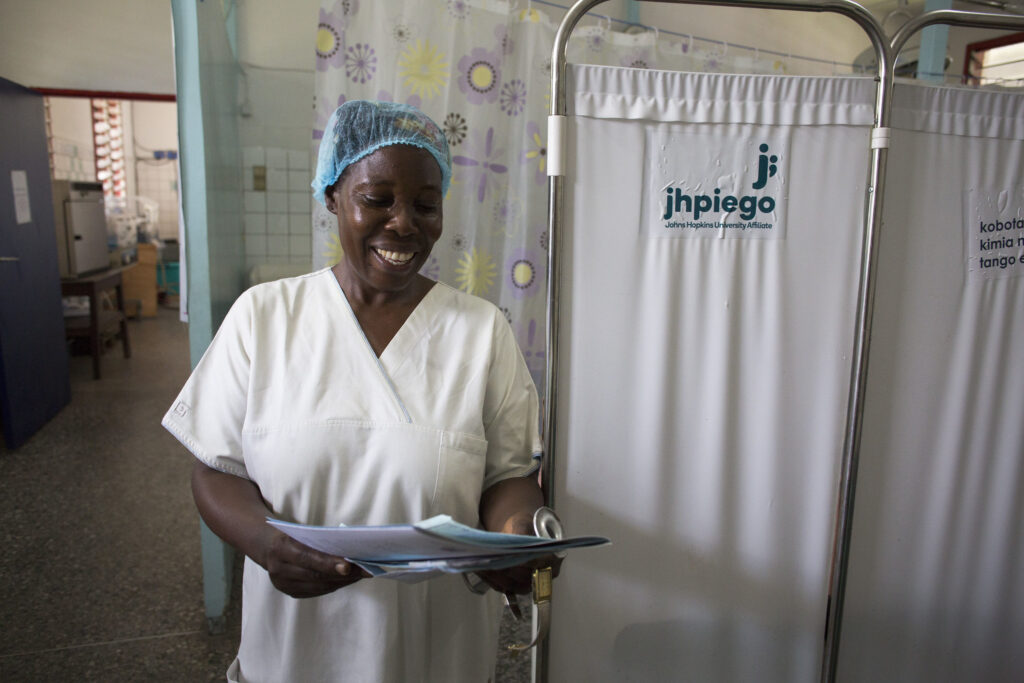
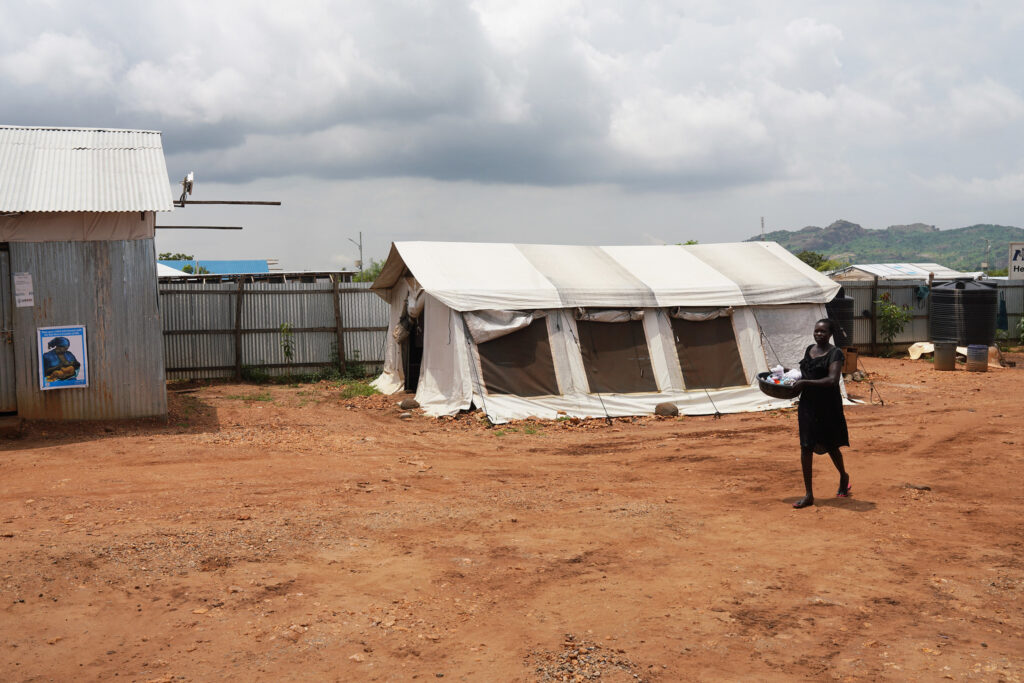
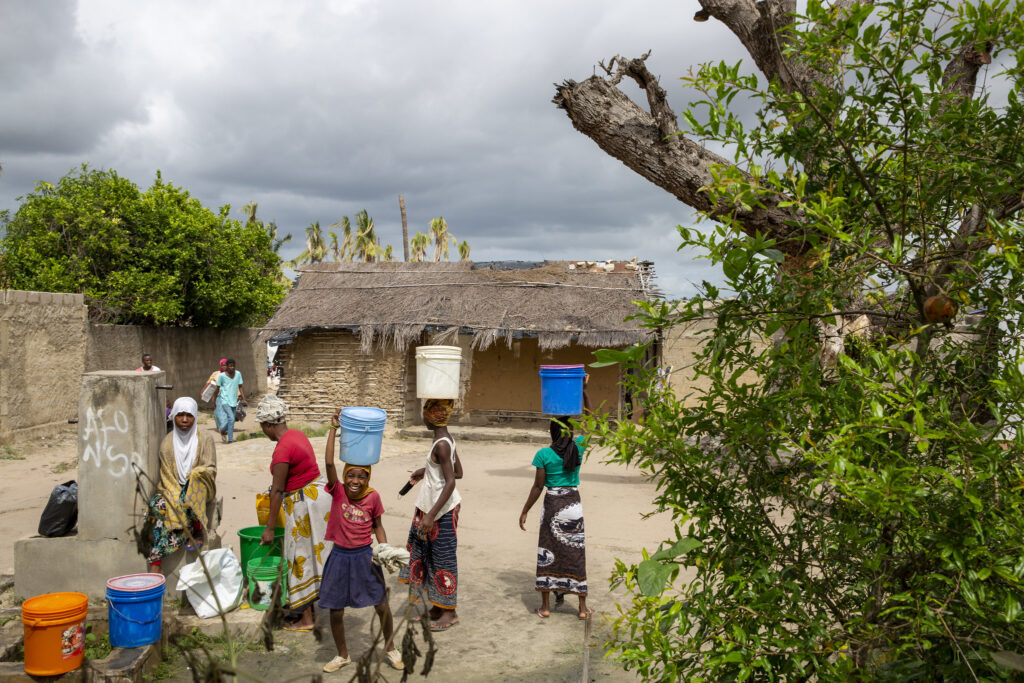
Bossemeyer has seen firsthand “the overlap between humanitarian and development responses and the gaps,” first as a country director in Mozambique and now in her role overseeing global program operations. “We live in an increasingly complex world and yet we are as vulnerable as we have never been before.”
Humanitarian aid addresses short-term and immediate needs after a crisis while development assistance focuses on long-term, systemic issues in countries with the goal of improving economic, political and social sectors. Unfortunately, conflicts and natural disasters are occurring more often and lasting longer, increasing the intersection of humanitarian and development needs; so Jhpiego is there to work hand in hand with our partners.
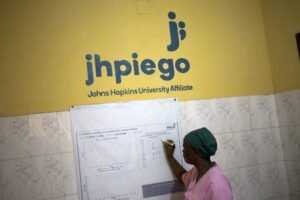
Bossemeyer explained that the pandemic revealed how humanitarian and development needs are becoming conjoined. “Various entities working in these formerly siloed spaces need to adapt to changing times and closely partner with, and complement, each other,” she says, emphasizing that “the needs and interests of communities will always drive Jhpiego’s work.”
In communities in crisis across Afghanistan, Pakistan and Myanmar, for instance, as well as in Ethiopia, South Sudan and the Democratic Republic of the Congo, Jhpiego has established a footprint along with deep trust and relationships, Bossemeyer says. The organization’s experts, program directors and staff who work during and after crises in these and other countries, ultimately, play an integral part in protecting the health and safety of the most vulnerable individuals.
Adds Ashengo: “We are expanding on the development work we’ve done for the past five decades because the geopolitical landscape is more complex, and the drivers of crises are changing.”
Here are a few examples of changes:
- The COVID-19 pandemic, in just a few short years, has forced everyone everywhere to radically adapt and innovate how they work and where they work.
- Climate change means more devastating storms happen more frequently; drought and flooding are no longer rare or localized to historically vulnerable places, but occur over widespread regions throughout the world.
- Civil unrest, armed conflicts and military coups are displacing people and disrupting services in disparate remote and urban communities, exacerbating health care inequalities.
For the past half century, in an effort to improve the health and safety of women and families in areas such as cervical cancer, postpartum hemorrhage, malaria, TB and HIV, Jhpiego has collaborated closely with local, national and international partners. Providing humanitarian assistance is a natural progression for Jhpiego, says Bossemeyer whose advocacy on the issue has generated interest organization-wide.
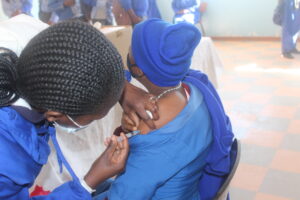
Case in point: Having mobilized services, such as voluntary medical male circumcision (VMMC), Jhpiego teams dared to leave the relative stability and security of established health facilities to deliver high-quality HIV-prevention services in remote communities in need. So, when the pandemic hit, Jhpiego pivoted, capitalizing on our strengths as a trusted partner working in communities, and nimbly adapted VMMC mobile clinics to roll out the COVID-19 vaccine in Lesotho.
“Just because it’s a crisis situation, we’re not going to lower the standard, quality or safety of our care,” Ashengo says, emphasizing that Jhpiego will continue to be flexible and adapt in order to innovate the ways it delivers services.
Jhpiego responded in Pakistan, where the AP reports that at least 610,000 pregnant women are struggling to get care after unprecedented flooding inundated a third of the country and drove millions from their homes. To help address the health crisis, with the support of the local government, Jhpiego Pakistan arranged medical relief camps in Khyber Pakhtunkhwa Province. Jhpiego also distributed supplies to families, including for newborns and for hygiene.
In Ethiopia, where Jhpiego has been a trusted partner for 20 years, armed forces have been fighting for the past two years in Tigray. Before the warring factions declared a ceasefire earlier this month, thousands of civilians had lost their lives and livelihoods with millions more displaced, not only in Tigray, but also in neighboring regions. Compounding the crisis, armed forces destroyed thousands of health facilities. In response, Jhpiego offered assistance to restore lifesaving health services. The staff efficiently assessed needs and offered support to two facilities: Akesta Hospital, the award-winning facility was rendered unable to help even pregnant women who were hemorrhaging and had to refer them to a hospital requiring an eight-hour trek by foot; and the Genete Health Center, where services that provide lifesaving vaccinations were disrupted. Jhpiego delivered equipment, supplies and training and provided critical mental health support to staff.
Jhpiego has also been working in Afghanistan for two decades. Today we maintain a substantial presence with nearly 300 staff in five major cities under the U.S. Agency for International Development-funded Urban Health Initiative. Following the deadly June 2022 earthquake, Jhpiego provided emergency services, staff and supplies to hospitals to deliver lifesaving care. Working with the Afghanistan Ministry of Public Health, Jhpiego provided antibiotics, painkillers, medical supplies and water for hundreds of survivors in the hardest hit province of Paktika province as they sought care from the provincial and district hospitals. More recently, Jhpiego supported the Dasht-e-Barchi Hospital in Kabul after a September 30 suicide bomber attacked an education center filled with 300 students. Surgical nurses, physicians and anesthesia technicians, along with medicines, were dispatched to the hospital to treat victims of the bombing.
When a crisis hits, Jhpiego will not wait for the situation to settle, much less leave, says Bossemeyer, “because that’s not who we are. And, there is no crisis too big for our teams.”




